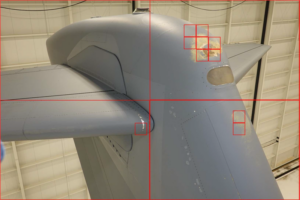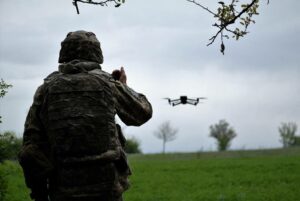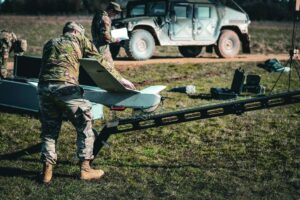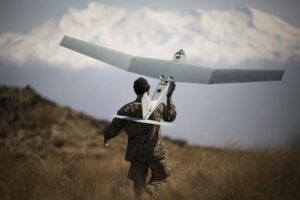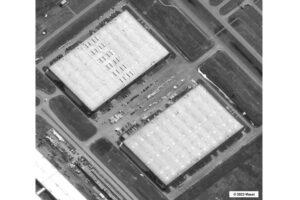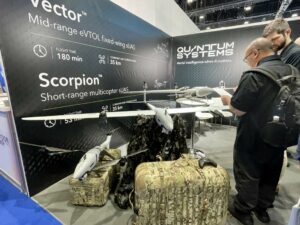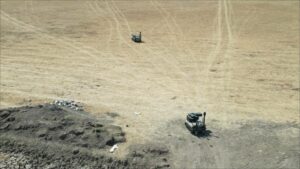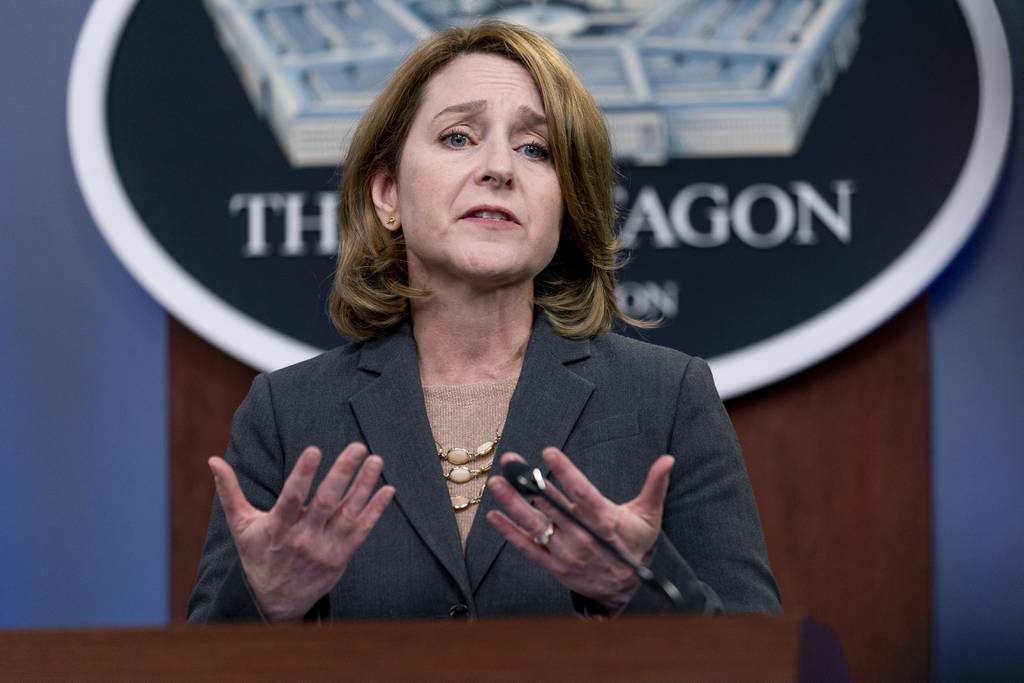
WASHINGTON — The Pentagon will select its first candidates for Replicator, an initiative to field thousands of drones in the next 24 months, within the next several weeks.
Deputy Secretary of Defense Kathleen Hicks, who is leading the initiative alongside the vice chairman of the Joint Chiefs of Staff, said Tuesday that Replicator will proceed in tranches, with groups of systems bought at different intervals. Speaking with reporters at a breakfast, she said the planned selection in early December will represent the first tranche of systems, which could include all domains and range in unit cost from tens to hundreds of thousands of dollars, depending on payload.
But a selection does not mean a public announcement, said the deputy secretary.
“We’re being very careful ... about the way in which we talk about Replicator,” Hicks said, noting Congress will be kept informed.
Her comment may be an understatement. Since announcing Replicator almost three months ago, Hicks has rarely spoken about it publicly. The limited information has left executives in the defense tech industry optimistic, but only cautiously so.
Executives interviewed by Defense News have said they don’t know enough about Replicator yet to increase production lines or raise new money to supply it. Some said a lack of new funding may keep the initiative from reaching its stated goals.
But Hicks said funding is not a concern.
“The money is in the programs,” she said. “There are attritable autonomy programs in the services or the [combatant commands].”
Replicator is not considered a new program, Hicks said, but it will accelerate existing ones. For comparison, she pointed to the Competitive Advantage Pathfinders, or CAP, and Rapid Defense Experimentation Reserve, efforts that boost acquisitions through new money and trimmed red tape.
Over the last few months, the Pentagon has scouted programs that would be useful for Indo-Pacific Command and could scale with such an intervention, Hicks said. Those identified will be the focus of Replicator, at least this fiscal year. In fiscal 2025, programs that still need maturing but that could still scale and aid INDOPACOM could also be included in the initiative.
Other programs already moving quickly enough will be left alone, Hicks said.
In all, the Defense Department’s focus will remain overwhelmingly committed to legacy platforms. Hicks estimated spending on attritable, autonomous platforms will represent about 0.5% of the Pentagon’s budget, with Replicator only a subset of that.
The hope, Hicks said, is that less can be more. Attritable drones, some adapted to meet battlefield needs, have shown enormous promise in Ukraine. A small investment in similar asymmetric systems for the Indo-Pacific, she said, could prove valuable.
“Our goal here is an operational goal ... and that operational goal is to create dilemmas for China,” Hicks said.
Noah Robertson is the Pentagon reporter at Defense News. He previously covered national security for the Christian Science Monitor. He holds a bachelor’s degree in English and government from the College of William & Mary in his hometown of Williamsburg, Virginia.
- SEO Powered Content & PR Distribution. Get Amplified Today.
- PlatoData.Network Vertical Generative Ai. Empower Yourself. Access Here.
- PlatoAiStream. Web3 Intelligence. Knowledge Amplified. Access Here.
- PlatoESG. Carbon, CleanTech, Energy, Environment, Solar, Waste Management. Access Here.
- PlatoHealth. Biotech and Clinical Trials Intelligence. Access Here.
- Source: https://www.defensenews.com/unmanned/2023/11/21/replicator-candidates-to-be-chosen-by-early-december-pentagon-says/
- :has
- :is
- :not
- 2025
- 24
- 70
- 9
- a
- About
- about IT
- accelerate
- acquisitions
- adapted
- ADvantage
- ago
- Aid
- All
- almost
- alone
- alongside
- already
- also
- an
- and
- Announcement
- Announcing
- ARE
- At
- autonomous
- Autonomy
- Battlefield
- BE
- being
- boost
- bought
- Breakfast
- budget
- but
- by
- CAN
- candidates
- cap
- careful
- cautiously
- chairman
- China
- chosen
- christian
- College
- comment
- committed
- comparison
- competitive
- Concern
- Congress
- considered
- Cost
- could
- covered
- create
- December
- Defense
- Degree
- Depending
- deputy
- different
- dilemmas
- does
- dollars
- domains
- Dont
- Drones
- Early
- efforts
- English
- enormous
- enough
- estimated
- Ether (ETH)
- executives
- existing
- few
- field
- First
- Fiscal
- Focus
- For
- from
- funding
- goal
- Goals
- Government
- Group’s
- Have
- he
- here
- his
- holds
- hope
- HTTPS
- Hundreds
- identified
- images
- in
- include
- included
- Increase
- industry
- information
- informed
- Initiative
- intervention
- interviewed
- investment
- IT
- ITS
- joint
- jpg
- Keep
- kept
- Know
- Lack
- Last
- leading
- least
- left
- Legacy
- less
- Limited
- lines
- May..
- mean
- Meet
- money
- Monitor
- months
- more
- moving
- National
- national security
- Need
- needs
- New
- New Funding
- news
- next
- noting
- of
- on
- ones
- only
- operational
- Optimistic
- or
- overwhelmingly
- pentagon
- planned
- Platforms
- plato
- Plato Data Intelligence
- PlatoData
- previously
- proceed
- Production
- Program
- Programs
- promise
- Prove
- public
- publicly
- quickly
- raise
- range
- rapid
- rarely
- reaching
- Red
- remain
- reporter
- represent
- Reserve
- Said
- says
- Scale
- Science
- secretary
- security
- select
- selection
- Services
- several
- she
- shown
- similar
- since
- small
- So
- some
- speaking
- Spending
- spoken
- Staff
- stated
- Still
- such
- supply
- Systems
- Talk
- tape
- tech
- tech industry
- tens
- that
- The
- The Initiative
- the joint
- they
- this
- those
- thousands
- three
- Through
- to
- Tuesday
- Ukraine
- unit
- Valuable
- very
- vice
- Vice Chairman
- virginia
- Way..
- we
- Weeks
- which
- WHO
- will
- william
- with
- within
- would
- year
- yet
- zephyrnet


